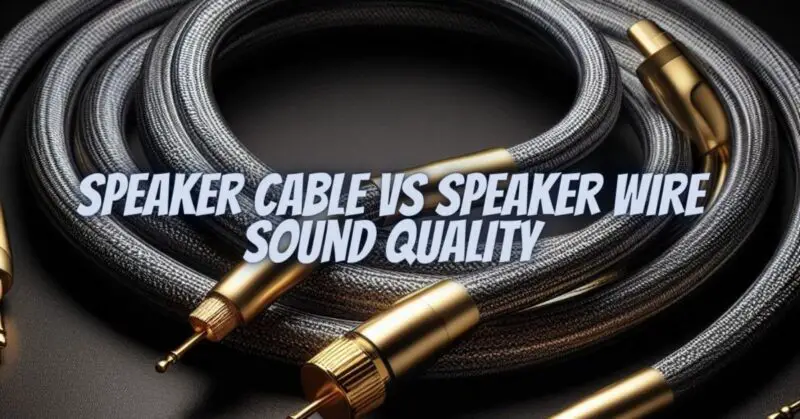When setting up a sound system, one of the critical decisions audiophiles and audio enthusiasts face is choosing the right speaker cables or wires to connect their speakers to amplifiers or receivers. The debate over speaker cable vs. speaker wire and its impact on sound quality has been ongoing for years. In this article, we’ll delve into the differences between speaker cables and speaker wires, their potential impact on sound quality, and help you make informed decisions for your audio setup.
Understanding Speaker Cables and Speaker Wires
Before discussing their impact on sound quality, it’s essential to understand what speaker cables and speaker wires are:
- Speaker Cables:
- Speaker cables are typically constructed with two insulated conductors twisted or bound together.
- These conductors are usually made of copper, but higher-end cables may use materials like silver or gold plating for enhanced conductivity.
- Speaker cables are generally thicker and more robust than speaker wires.
- They are often terminated with connectors, such as banana plugs or spade connectors, to ensure a secure and convenient connection to amplifiers or speakers.
- Speaker Wires:
- Speaker wires are simpler in construction, consisting of two separate conductors, usually made of copper or aluminum.
- Speaker wires lack the additional insulation and protection found in speaker cables.
- They are typically more flexible and easier to work with due to their thinner profile.
- Speaker wires often require bare wire connections or connectors to be added separately.
Impact on Sound Quality
The impact of speaker cables and speaker wires on sound quality is a subject of much debate among audio enthusiasts. Let’s examine the key factors that may influence sound quality:
- Resistance:
- Resistance in cables or wires can lead to energy loss and impact sound quality. Lower resistance results in better signal transmission.
- Speaker cables often have lower resistance due to their thicker conductors, potentially leading to a more efficient transfer of electrical signals.
- Capacitance and Inductance:
- Capacitance and inductance are inherent properties of cables and wires. High capacitance can lead to a loss of high-frequency signals, while high inductance can affect low-frequency response.
- Speaker cables, with their specific construction and insulation, can be designed to minimize these effects.
- Cable Length:
- The length of the cable or wire can significantly impact its electrical properties. Longer cables or wires can introduce more resistance, capacitance, and inductance into the system.
- It’s crucial to choose the appropriate length for your setup to minimize these effects.
- Quality of Materials:
- High-quality materials, such as oxygen-free copper (OFC), silver, or gold plating, can improve conductivity and reduce signal loss.
- Premium speaker cables often incorporate these materials, potentially offering a sound quality advantage.
- Connectors:
- The connectors used at the ends of the cables or wires can impact sound quality. High-quality connectors, such as gold-plated connectors, may offer better signal transfer and durability.
Myths vs. Realities
To provide a balanced perspective, let’s address some common myths and realities regarding speaker cables and speaker wires:
- Myth: Expensive Speaker Cables Guarantee Better Sound Quality
- Reality: While premium speaker cables may offer some advantages in specific setups, the improvements in sound quality are often subtle and may not be noticeable in most home audio systems.
- Myth: Thicker Cables Always Perform Better
- Reality: Thicker cables may have lower resistance, but the ideal cable thickness depends on factors like cable length and the impedance of your speakers. In some cases, thicker cables can be overkill.
- Myth: Speaker Wires Are Always Inferior
- Reality: Speaker wires can provide excellent sound quality in many situations, especially when used with well-matched components and correct lengths.
In the speaker cable vs. speaker wire debate, the impact on sound quality can vary depending on your specific audio setup, equipment, and preferences. While premium speaker cables may offer some advantages, the differences are often subtle and may not justify the added cost for all users.
Choosing the right cables or wires for your audio system involves considering factors like cable length, equipment quality, and the acoustics of your listening environment. Before making a decision, carefully assess your setup, budget, and priorities to strike the right balance between performance and cost. Ultimately, achieving the best sound quality is not solely dependent on cables or wires but on the synergy between all components of your audio system.


